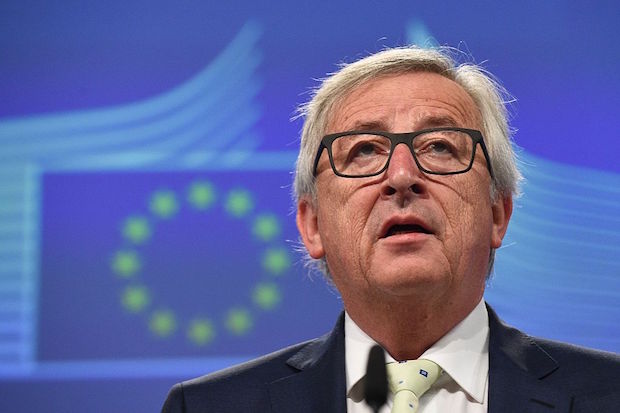Much of the media attention in recent days has been focused on the vacuum of leadership in Westminster. However, Britain’s momentous decision to leave the EU has exposed deep cracks in relations with the European Union.
Almost immediately after the Brexit vote, nations across continent woke up to the new possibility of leaving the bloc. This has left Europe’s leaders scurrying to prevent the so-called ‘Brexit contagion’.
![brexitcontagion[1] copy](http://blogs.spectator.co.uk/files/2016/06/brexitcontagion1-copy.jpg)
The Eurosceptic charge was led by Marine Le Pen who called for a referendum in France and all other EU states. President Hollande has since rejected her calls, however, it would seem that Le Pen is echoing concerns of the majority in France. 53% of the country would like to vote in a referendum on continued membership of the EU, according to a recent study by the University of Edinburgh. Meanwhile, advocating an end to EU expansion and the curtailment of the institutions’ powers, former French Prime Minister Alain Juppé called for Europe to be ‘re-invented’ following the Brexit vote.
In Italy, the resurgent Five-Star Movement has begun calling for a referendum on whether the country should remain in the struggling Eurozone. The party is suggesting the adoption of two different EU currencies to respond to the diverging economic climates within the Euro area. Furthermore, Italy’s Northern League praised Britain’s democratic decision and advocated an in-out referendum on Italy’s continued EU membership.
Similar sentiments have been expressed in Sweden and Denmark, states which, like Britain, are outside the Eurozone and are viewed as being more open to the prospect of withdrawal. The Swedish anti-immigration party led calls for a British-style renegotiation with the EU followed by a referendum on membership. Across the maritime border in Denmark, both the Red-Green Alliance and the Danish People’s Party said Britain’s decision should lead to a similar vote by the Danish people.
‘We want to be in charge of our own country, our own money, our own borders, and our own immigration policy’, declared the leader of the Dutch Freedom Party in a speech which British voters will find fairly familiar. The party is calling for a referendum on EU membership ‘as soon as possible’. This comes as a poll by the Dutch current affairs programme EenVandaag revealed that 54% of the population would like a referendum and some 48% would currently vote in favour of leaving the EU.
Meanwhile, Greece’s Alexis Tsipras has blamed the Brexit vote on the ‘chronic deficiencies’ of EU leaders and their determination to pursue austerity policies. Tsipras went on to assert that the decision should be a ‘wakeup call for the sleepwalker who is heading towards the abyss’.
It seems some in Europe believe replacing the Commission President will go some way to prevent disintegration. The Czech Foreign Minister Lubomir Zaoralek has called on Jean-Claude Juncker to resign in the wake of Britain’s vote to leave the EU. Juncker is not ‘the right man for the job’, said Mr Zaoralek adding that Mr Juncker is a ‘negative symbol’ of Europe. Furthermore, an opinion piece published in the Frankfurter Allgemeine claims Jean-Claude Juncker failed to understand the European Union and calls on him to head for the exit.
The European Council President is also in the firing line. Former Polish Prime Minister Jarosław Kaczyński has criticised Donald Tusk’s negotiation with Britain and called on him to ‘disappear from European politics’.
Europe’s leaders are also divided on how best to manage Britain’s upcoming exit from the bloc. Some are keen for Article 50 to be triggered within days, however, others appear to be in no rush for the withdrawal process to begin.
A concern for the French Foreign Minister is that delaying Britain’s renegotiation leaves a ‘gap’ which will be filled by populism. Also stressing the urgency of the situation, France’s President Hollande compares British exit to a divorce, saying that it will be ‘painful for those who stay behind’. Commission President Jean-Claude Juncker continues Hollande’s analogy, asserting that it is ‘not an amicable divorce, but it was not exactly a tight affair anyway’. Meanwhile, the German Foreign Minister has called for the process to begin “as soon as possible” to prevent the EU being left in ‘limbo’.
However, European Council President Donald Tusk has stressed that at this ‘historic moment’ there should be no ‘hysterical reactions’. Mr Tusk has previously warned that EU leaders’ obsession with ‘instant and total integration’ has fuelled a rise in Euroscepticism. Germany’s Angela Merkel also struck a more conciliatory tone in saying she ‘would not fight’ for a short time frame for British withdrawal and stressed that the UK will ‘remain a close partner’.
Facing up to the reality of a member state withdrawing, the European Union is at a turning point. There are growing demands for a move away from such a supranational system of government. The Eurosceptic genie is now undoubtedly out of the bottle and the survival of the European Union will now be determined by the response of its leaders.






Comments